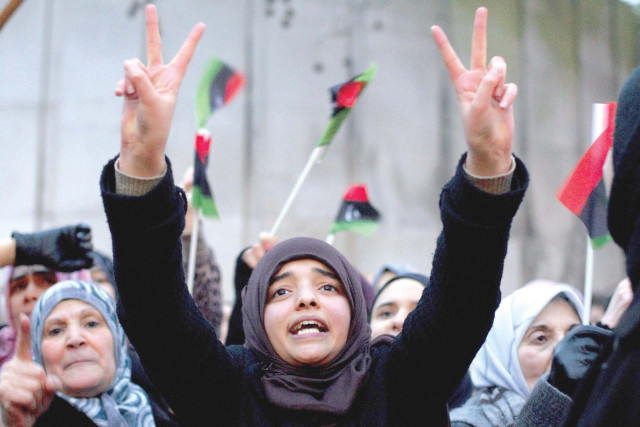Scores of protesters killed by Libyan security forces
Libyans protesting against Muammar Qaddafi’s rule appeared to control the streets of Benghazi on Sunday.

The United States “strongly objected” to Libya’s crackdown and urged Tripoli to allow peaceful protests.
Amnesty International urged Qaddafi to “immediately rein in his security forces, while Libya has told the European Union it will stop cooperation with the bloc in stemming illegal migration to Europe if the EU encourages the protests, the Hungarian EU presidency said.
Witnesses said Libya’s second city was in chaos, with government buildings ransacked and troops and police forced to retreat to a fortified compound, from where they picked off demonstrators with sniper and heavy-weapons fire.
“The security forces are in their barracks and the city is in a state of civil mutiny,” one witness told Reuters.
Local government offices and police stations had been torched, the witnesses said. As on previous days, thousands of people gathered near the northern Benghazi courthouse on Sunday chanting: “We want to bring down the regime.”
Elsewhere, security forces said they have foiled an attempt by saboteurs to set fire to oil wells.
New York-based Human Rights Watch said security forces had shot dead at least 170 people, mostly in the eastern coastal city of Benghazi. At least 20 of them were killed overnight after the security forces fired heavy weapons at civilians from a fortified compound.
One witness said many police and regular troops had joined protesters. “Right now, the only military presence in Benghazi is confined to the Command Centre Complex in the city. The rest of the city is liberated,” said another witness.
Witnesses told AFP by telephone that Libyan security forces clashed with anti-regime protesters in the Mediterranean city of Misrata, 200 kilometres from Tripoli.
France and Germany called the government response unacceptable and totally disproportionate, and people in London and Cairo protested against the Qaddafi regime.
British Foreign Secretary William Hague urged Libya to begin dialogue with the protesters and implement reforms, in a phone call to Qaddafi’s son Saif al-Islam Qaddafi.
Libyan dissidents in Britain welcomed Hague’s comments but insisted it was “not enough”.
Guma el Gamaty, a prominent Libyan writer and political activist, said he feared a massacre “unprecedented in North Africa” unless western leaders apply acute pressure on the Qaddafi regime.
“Believe me, Qaddafi is going down but he won’t go without killing as many people as possible,” he said.
The clamour for reform across a region of huge strategic importance to the West and the source of much of its oil began in Tunisia in December. The overthrow of President Zine al Abidine Ben Ali then inspired Egyptians to rise up against strongman Hosni Mubarak, overthrowing him on Feb. 11.
The tide has challenged Arab leaders, including many who have long been backed by the West as vital energy suppliers and enemies of militants.
In Iran, thousands of security personnel were deployed on the streets of Tehran and other cities to prevent protesters rallying in spite of a ban, opposition websites said.
Published in The Express Tribune, February 21st, 2011.



















COMMENTS
Comments are moderated and generally will be posted if they are on-topic and not abusive.
For more information, please see our Comments FAQ